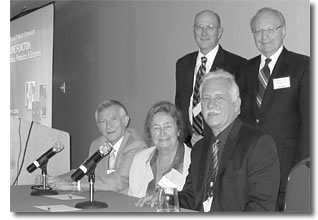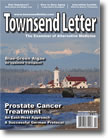On October 1 and 2, 2010, Health Education and WorldLink Medical, in partnership with Klaire Labs, a division of ProThera Inc., sponsored the Fourth Annual Probiotic Symposium on Immune Function: Probiotics, Prebiotics, and Enzymes, held in New Orleans. An acclaimed international faculty reviewed the vital role of the gastrointestinal microflora in the normal development and continued modulation of the immune system. The multifaceted role of gastrointestinal dysbiosis in the development of allergic and autoimmune diseases was reviewed and the most recent research on the use of probiotics, prebiotics, and enzymes to prevent or treat immune-mediated disorders was presented. The symposium was moderated by Dr. Stephen Bajo, medical director of Renown Health, a nationally recognized and respected integrated health system.
Dr. Gerard Mullin, associate professor of medicine and director of integrative nutrition services at Johns Hopkins School of Medicine and Hospital, delivered a highly enlightening overview of the dramatic increase in autoimmune diseases ranging from systemic lupus erythematosus to type 1 diabetes mellitus over the past 60 years. He noted that while many individual autoimmune diseases are uncommon, all totaled they affect over 23 million Americans. Mullin observed that autoimmunity develops as a result of a break in tolerance due to cross-reactivity of foreign antigens with host antigens. Gastrointestinal dysbiosis and "leaky gut" are key contributors to the development of autoimmune disorders. He set forth the essential role played by probiotics in preventing the occurrence of autoimmune diseases. Among the mechanisms by which the gut microbiota modulate the immune system is an ongoing low-grade stimulus of Toll-like receptors that induces a healthful regulatory T cell response and blockade of NFkB translocation to the cell nucleus, which halts the transcription of proinflammatory cytokines. Mullin concluded by presenting new research showing that the endoplasmic reticulum and mitochondrial stress regulation are emerging targets of probiotic activities.
Dr. Michael Cabana, professor of pediatrics, epidemiology, and biostatistics and chief of the Division of General Pediatrics at the University of California, San Francisco, provided a lucid overview of the hygiene hypothesis and the current epidemic of allergic diseases. Cabana communicated the epidemiologic relation between the reduced prevalence of infectious diseases in childhood, improved sanitation and housing, increased usage of antibiotics, and smaller family sizes and the burgeoning incidence of allergic diseases and asthma. He presented clinical research showing that probiotics administered to pregnant women for 1 month prenatally and then to infants for 6 months postpartum significantly reduced the development of atopic eczema. Cabana proceeded to deliver a status report on his ongoing NIH-sponsored trial of probiotics to prevent the development of early markers of asthma in infants at high risk for developing asthma. To date, 160 families have been recruited into this multicenter trial. He concluded by stating that probiotics are clearly effective for treating diarrhea and colic in infancy, are safe, and hold great promise for the prevention and treatment of allergic disorders and asthma.
Dr. Helena Tlaskalová-Hogenová, professor of immunology at the First Faculty of Medicine, Charles University in Prague, Czech Republic, spoke on the complex interactions between probiotic commensal gut microbiota and the mucosal immune system. She summarized the roles of mucosal epithelial cells and mucin in maintaining mucosal barrier, reviewed the anatomy and physiology of the mucosal immune system, and highlighted the mechanisms whereby the gut microbiota modulate the innate and acquired immune systems. Tlaskalová-Hogenová outlined her decades of research using gnotobiotic animals, which has documented that germ-free animals are at greater susceptibility to diseases ranging from type 1 diabetes mellitus to atherosclerosis, while gut dysbiosis contributes to inflammatory bowel disease and ankylosing spondylitis. She noted that among the numerous benefits of probiotics are the inhibition of pathogenic microorganisms, preservation of gut barrier function, increased gastrointestinal transit time, antioxidant effects, and immunomodulation.
Dr. Marko Kalliomäki, consultant in pediatric gastroenterology and adjunct professor of pediatrics at the University of Turku in Finland, concluded the first day of the symposium with a presentation of his research on the use of probiotics to prevent and treat atopic diseases in childhood. Kalliomäki noted that an altered gut microflora is all too frequently a consequence of the modern Western hygienic lifestyle. He presented data showing that the increased prevalence of cesarean sections and perinatal antibiotic administration are significantly disrupting the neonatal gut microbiota, now unequivocally linked to an increased risk of atopic diseases in infancy and later childhood. Kalliomäki presented the most recent results of the long-running clinical trial of probiotics to reduce the risk of atopic diseases in high-risk infants. He has found that Lactobacillus rhamnosus GG administered for 6 months significantly reduces the incidence of atopic eczema by 50% at age 2 and by 44% at age 4. Kalliomäki proposed that probiotic induction of antagonists to NFkB may be an important mechanism for the reduction of risk for allergic disorders.
Dr. Martin H. Floch, master of the American College of Gastroenterology and clinical professor of medicine at Yale University, began the second day of the symposium with an overview of probiotics and inflammatory bowel disease (IBD). Floch noted that the gut microbiota is abnormal in IBD, with reduced populations of Faecalibacterium prausnitzii and increased numbers of Escherichia coli. He reviewed the levels of evidence for the use of probiotics in IBD. The strongest support exists for the use of a high dose multispecies probiotic for pouchitis. A moderate amount of evidence supports the use of high-dose multispecies probiotics and of Escherichia coli Nissle 1917 for ulcerative colitis. Floch said that probiotics have been disappointing in the treatment of Crohn's disease, although two studies support the use of Saccharomyces boulardii tomaintain remission during medical therapy.
Dr. William H. Marks, former Robert B. McMillen Chair for transplantation at Swedish Hospital Medical Center in Seattle, Washington, and currently executive medical director for Alexion Pharmaceuticals, presented the results of a recent clinical trial of Klaire Labs probiotics versus placebo for the prevention of immunosuppression-associated diarrhea (IAD) in patients following kidney transplantation. IAD is a major problem for patients following organ transplantation, which may be associated with rejection, loss of transplant, and hospitalization. Marks hypothesized that increasing colonic short-chain fatty acid concentrations using probiotics may reduce the risk of IAD. Marks found that the administration of 200 billion CFU per day of a mix of 3 Lactobacillus and 3 Bifidobacterium species significantly reduced the percentage of days with diarrhea, the number of days with diarrhea, and the number of diarrheal episodes per patient. Overall, probiotics reduced the risk of diarrhea by 71.6%. Probiotics were found to be safe in this immunosuppressed population.
Dr. Erkki Savilahti, professor of pediatrics and chief of the Department of Gastroenterology, Nutrition, and Clinical Immunology at the Hospital for Children and Adolescents, University of Helsinki, presented his research on the use of pre- and probiotics in the management of food allergies and asthma. He noted that food allergies are common in children with atopic eczema. Savilahti reviewed 7 out of 10 studies of probiotics in eczema that have found a beneficial effect. The benefit of probiotics for eczema is not related to the presence of food allergies. Probiotics have not been found helpful in the management of food allergies, but may accelerate healing following withdrawal of allergen(s) from the diet. Savilahti reviewed data showing the benefits of prebiotic gaactooligosaccharides and fructooligosaccharides for the prevention of allergic disorders in infants. So far, prebiotics, probiotics, and synbiotics have not been shown to be beneficial in preventing asthma.
Dr. Stephen Olmstead, chief science officer of Klaire Labs, ended the symposium with a review of immunological abnormalities in patients with chronic fatigue syndrome and with chronic candidiasis sensitivity (yeast syndrome). He noted that Candida species are highly immunogenic and associated with systemic allergies. Olmstead put forth his hypothesis that chronic candidiasis sensitivity and many cases of chronic fatigue syndrome, fibromyalgia, and other somatoform disorders are due to an immune response to gastrointestinal and/or vaginal Candida biofilm communities. He defined biofilm as a heterogeneous community of attached microorganisms encased in a self-produced matrix and reviewed what is currently known about Candida biofilms. Olmstead reviewed his invention of a formulation of enzymes shown in laboratory studies to disrupt Candida and other pathogenic biofilms. He outlined a clinical approach to disrupting Candida biofilm using the enzyme formulation that facilitates yeast eradication using appropriate antifungals. He emphasized the importance of using probiotics and prebiotics to restore and support healthy gastrointestinal microbiota and mucosal immunity.
 A set of CDs with the accompanying symposium syllabus are available for order at www.ProbioticSymposium.com or by calling 888-488-2488. Klaire Labs will organize and fund the Fifth Annual Probiotic Symposium, the focus of which will be practical clinical applications of probiotics, prebiotics, and enzymes in the management of gastrointestinal, genitourinary, and immunological disorders. The Fifth Annual Probiotic Symposium is planned for September 23 and 24, 2011, in Alexandria, Virginia. A set of CDs with the accompanying symposium syllabus are available for order at www.ProbioticSymposium.com or by calling 888-488-2488. Klaire Labs will organize and fund the Fifth Annual Probiotic Symposium, the focus of which will be practical clinical applications of probiotics, prebiotics, and enzymes in the management of gastrointestinal, genitourinary, and immunological disorders. The Fifth Annual Probiotic Symposium is planned for September 23 and 24, 2011, in Alexandria, Virginia.
|



![]()
![]()
![]()

 A set of CDs with the accompanying symposium syllabus are available for order at
A set of CDs with the accompanying symposium syllabus are available for order at 